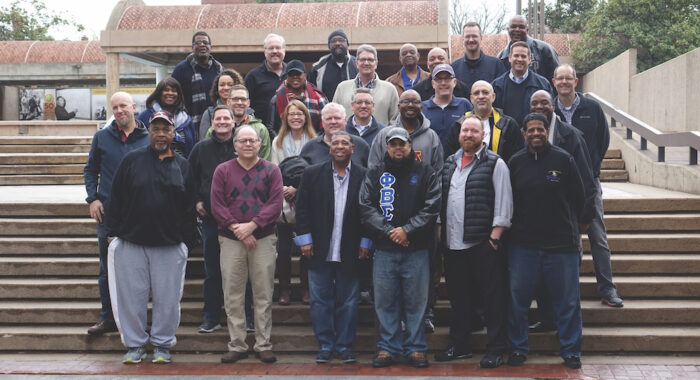Church hurt is the worst kind of hurt. It’s like getting stabbed in the back while the person holding the knife is looking directly into your eyes. When the very people and institutions that should protect us betray us, we are often left in a rubble of disappointment, disillusionment and despair.
But we aren’t without hope. Jesus, our living hope, desires that all of his children be reconciled to him and to one another. And I, personally, want revival more than revenge.
Throughout the Scriptures we meet men and women who were honest that a life of loving God, loving people and going and making disciples wasn’t for the faint of heart. Our brother Paul doesn’t mince words when he said that “In hard traveling year in and year out, I’ve had to ford rivers, fend off robbers, struggle with friends, struggle with foes. I’ve been at risk in the city, at risk in the country, endangered by desert sun and sea storm, and betrayed by those I thought were my brothers (2 Corinthians 11:26 MSG).”
I wish I could tell you that after 20 years of being a pastor’s kid, I hit my church hurt quota. But I then continued to serve in ministry for 20 years, and with each year I chose to remain in ministry, it was clear loving and serving God’s people was a risky business. We can be deeply hurt by those we love; but you, my brothers and sisters in the faith, are worth the risk.
Even in seasons where I wasn’t on a church staff, I wasn’t exempt from the challenges and frustrations of being part of a faith community. The Biblical Counseling Coalition defines “church hurt” as “the painful experiences of being exploited in the context of a collective local church, where spiritual language or even Scripture may be leveraged to justify wrongdoing and protect offenders.” It can also be used to mean a wide range of experiences in which someone is emotionally, mentally, spiritually, or even physically hurt by someone or several people within the church. Church hurt seems to be everywhere, and over the past several years, “church hurt” has become a buzzword on social media platforms and discussion panels among evangelical leaders.
How do we heal after being betrayed by those we trusted? How do we walk with those who have not only been hurt by the Church, but abused by spiritual leaders? How do we find the strength to try again after several attempts to find a healthy church family? Many church leaders are internally asking the same questions as they are also trying to minister to those who are considering leaving not only their church, but their faith altogether.
Church hurt is the worst kind of hurt. It’s like getting stabbed in the back while the person holding the knife is looking directly into your eyes. When the very people and institutions that should protect us betray us, we are often left in a rubble of disappointment, disillusionment and despair.
Many people (including church staff) in our Sunday services have been directly impacted by a moral failure of a former pastor, church infighting, a toxic church environment or a manipulative coworker misusing the name of Jesus. Scriptures have been used to justify abuse, jobs have been threatened, reputations have been on the line. And they sit in the back of the sanctuary with their arms crossed and even in the front with their hands raised as wounded sheep just waiting to experience more hurt and give them a reason to walk away for good.
Indeed we often see “church hurt” and “deconstruction” used together by those on varying faith journeys. Though some Christians may wince at deconstruction, we don’t have to see it as confrontation but rather an invitation to lean in. Listening is a beautiful ministry.
Deconstruction doesn’t always lead to deconversion. In fact, it is good to critically examine and dismantle false narratives placed on our faith by society or by poor theology. However, deconstructing without any intention to rebuild can lead to destruction. Church leaders aren’t supposed to convince anyone to stay in a church building, but our job is to lead them toward their good Father who sits with them in the tension of their wondering, wandering and wrestling.
Church hurt is real, and the first step to healing is acknowledging the hurt.
When Shepherds Fall, and the Sheep Are Weary
What happens when those of us in the local church who have been the trusted leaders, faithful friends and reliable volunteers find ourselves disappointed and hurt while also trying to help others heal?
After Paul gives us his long list of ministry woes in 2 Corinthians 11, he continues in Chapter 12, “I do admit that I have fears that when I come you’ll disappoint me and I’ll disappoint you, and in frustration with each other everything will fall to pieces — quarrels, jealousy, flaring tempers, taking sides, angry words, vicious rumors, swelled heads, and general bedlam” (2 Corinthians 12:20–21 MSG).
It appears that since the New Testament there has been a fear of hurt and disappointment. How do we as the imperfect people entrusted by a perfect God to build his Church alongside of him do so while simultaneously healing and helping others heal?
I believe Paul gives us some direction in 2 Corinthians 13 (MSG).
1. Test yourselves to make sure you are solid in the faith — Where has the enemy caused confusion and chaos in relationships, your prayer life, conversations and situations? Have you done the hard and holy work of pursuing personal healing through counseling, wise counsel, prayer, fasting, repentance and forgiveness? Is my faith in Jesus Christ solid or has a season of disappointment and hurt cracked my once solid foundation?
2. Don’t drift along taking everything for granted. Give yourselves regular checkups — Sometimes we have to leave a church to stay with Jesus, but don’t stay gone for too long. Pursue a new biblical community under a safe shepherd to help your healing journey. Pursue daily time in the Word of God reflecting and resting, worshipping privately and corporately and staying in close connection with mentors and those who love you.
3. Don’t just put up with your limitations; celebrate them — Paul boasts of his weaknesses because in them God’s great strength was revealed. Celebrate the thorn in your flesh and the scars that have become your testimony. What you have walked out — the hurt, the abuse, the disappointment — will help others share their stories and invite them to know a Jesus they have always wanted to know who doesn’t punish us for weakness but shows up in greater strength!
4. Allow God to demonstrate his supernatural strength in your life — Paul concludes Chapter 13 with this encouragement, “And that’s about it, friends. Be cheerful. Keep things in good repair. Keep your spirits up. Think in harmony. Be agreeable. Do all that, and the God of love and peace will be with you for sure.”
Getting Back in the Boat
Even after three shipwrecks, Paul kept getting back in the boat, and I like to think it’s because he knew the reward of taking the message of Jesus Christ to those in need of a Savior was greater than the risk of what might be waiting for him out at sea.
We will have to make that same decision every time we choose to step back into a church or leadership position after a season of hurt. We will need to cling to hope and believe that God and his people are worth the risk.
You may find yourself sitting in a small group, or back on a church staff or elder board, or in a brand new congregation and flinch every time the enemy tries to use something or someone to make you want to run. Yet God has positioned you to be a voice for the voiceless, to speak up when you see someone being hurt or abused, to have influence in a church culture that needs your patient endurance and perseverance.
What the enemy tried to use to harm you, God will turn for your good and his glory.
Hold on to Jesus, eyes fixed on him. Ask the Lord for wisdom and discernment to know when to stay and when to go and believe he is with you in the coming and the going, calming the raging seas and positioning your Paul when you were expecting a Saul.
God loves his Church; we are God’s Church. Where there is unity, it commands the blessing of the Lord. While we may not be perfect, we are his and he loves his bride very much.
Don’t grow weary, dear saints. Church hurt is real, but our healer is here. Reach out and touch him, even now he passes by.
Natalie Runion is a speaker, worship leader, pastor and founder of Raised to Stay. She has served in ministry at several churches, including New Life Church (Colorado Springs, CO), Horizon Community Church (Cincinnati, OH), and Kings Point Church of God (Cincinnati, OH). After witnessing many of her peers walk away from the Church and their faith, she started Raised to Stay as a place of healing and community for those who have been bruised by the Church. She is also the author of “Raised to Stay: Preserving in Ministry When You Have a Million Reasons to Walk Away” where Runion recounts her story of persevering in the faith despite being deeply wounded by a Christian community. Runion is a graduate of Miami University.




 View All Articles
View All Articles 





























